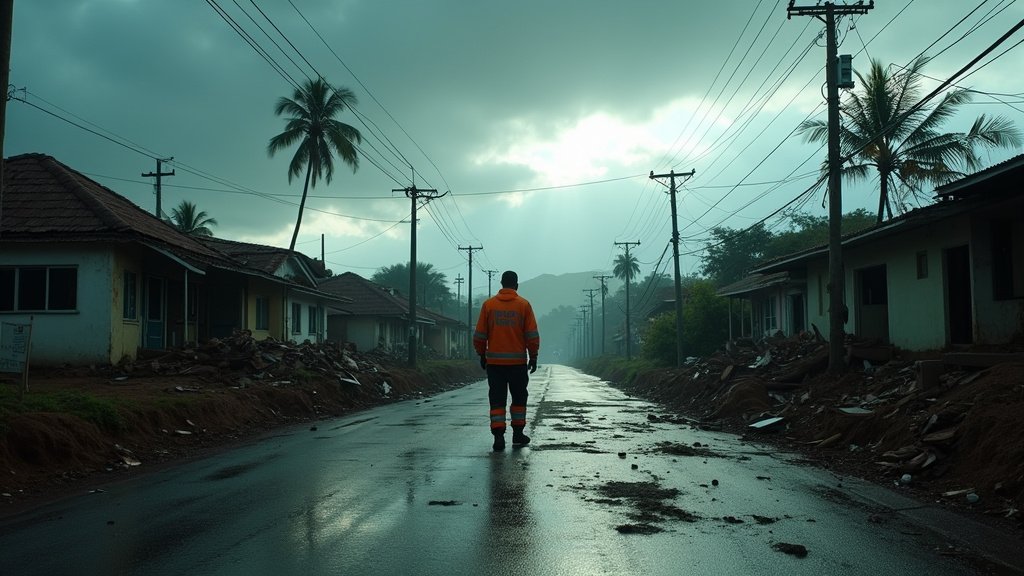Hurricane Melissa, a catastrophic Category 5 storm, has carved a path of unprecedented destruction across the northern Caribbean, leaving dozens dead and entire communities in ruin. This powerful hurricane, Hurricane Melissa, made landfall in Jamaica with sustained winds reaching up to 185 mph, making it one of the strongest Atlantic hurricanes on record and the most intense to ever hit the island nation, a true Caribbean disaster.
The Fury of Hurricane Melissa: A Category 5 Storm
As Hurricane Melissa intensified, it became the most powerful storm of 2025, tying records for Atlantic hurricane landfalls by both wind speed and barometric pressure. Its initial landfall in Jamaica on Tuesday, October 28, brought catastrophic gusts and torrential rainfall, estimated to be as high as 30 inches in some areas. The storm’s slow movement across the island exacerbated the damage, causing widespread flooding and landslides, with the devastating impact of Hurricane Melissa affecting 77% of the country.
Even after weakening to a Category 3 storm, Hurricane Melissa continued its destructive path, making a second landfall in eastern Cuba early Wednesday. Forecasters warned of its life-threatening potential for the Bahamas and Bermuda as it moved northeast. The sheer force of Hurricane Melissa has dominated news cycles across the globe, with its impact quickly becoming the lead headline.
Jamaica Destruction from Hurricane Melissa
The impact on Jamaica has been particularly severe, with the destruction from Hurricane Melissa being tremendous and unprecedented. Preliminary assessments indicate “tremendous and unprecedented destruction of infrastructure,” with homes losing roofs, utility poles toppled, and roads turned into mud pits by landslides. Critical facilities, including hospitals and schools, suffered significant damage. In Santa Cruz, a town in Jamaica’s St. Elizabeth parish, a massive landslide blocked main roads, submerging streets. Over 25,000 people have been displaced and are seeking refuge in emergency shelters, while hundreds of thousands are without power due to the effects of Hurricane Melissa. Reports indicate at least eight fatalities in Jamaica, including two bodies found washed ashore in Black River.
The Human Toll in Haiti and Cuba from Hurricane Melissa
Haiti has also borne the brunt of Hurricane Melissa’s ferocity, with catastrophic flooding from the La Digue River causing widespread devastation. Reports confirm at least 23 deaths in Haiti, with many more missing, primarily in the southern coastal town of Petit-Goâve, where dozens of homes collapsed. The country’s Civil Protection Agency noted that the number of dead and missing often fluctuates in the initial days following such disasters, underscoring the scale of this Caribbean disaster.
In Cuba, Hurricane Melissa brought collapsed houses, blocked mountain roads, and ripped roofs off buildings, with the heaviest destruction concentrated in the southwest and northwest regions. Cuban President Miguel Díaz-Canel described the damage as “extensive.” Authorities evacuated over 735,000 people into shelters, who are now beginning to return home as cleanup efforts commence. Even countries outside Hurricane Melissa’s direct path, such as Panama and Costa Rica, experienced secondary impacts like flooding and landslides from its outer bands.
Response and Recovery Underway After Hurricane Melissa
International aid and response efforts are mobilizing rapidly following the devastation caused by Hurricane Melissa. The United States has deployed disaster assistance teams, including urban search-and-rescue units, to assess needs and provide critical relief. The UK government is providing £2.5 million in emergency humanitarian funding, and relief supplies are being pre-positioned for rapid deployment. Organizations like the UN, Red Cross, Samaritan’s Purse, and Team Rubicon are on the ground or preparing to deliver essential supplies such as shelter kits, water filtration systems, hygiene kits, and medical aid, a crucial natural disaster response.
However, significant challenges remain in the wake of Hurricane Melissa. Damaged infrastructure, including washed-out roads and bridges, and communication outages are hampering assessment and aid delivery efforts. The governments of Jamaica, Cuba, and Haiti have activated nationwide emergency mechanisms, conducted mass evacuations, and opened shelters, while working to restore essential services. The tourism industry in Jamaica, a vital economic driver, has also been severely impacted by Hurricane Melissa, with resorts and ports suffering significant storm damage, signaling a long road to recovery for the island.

